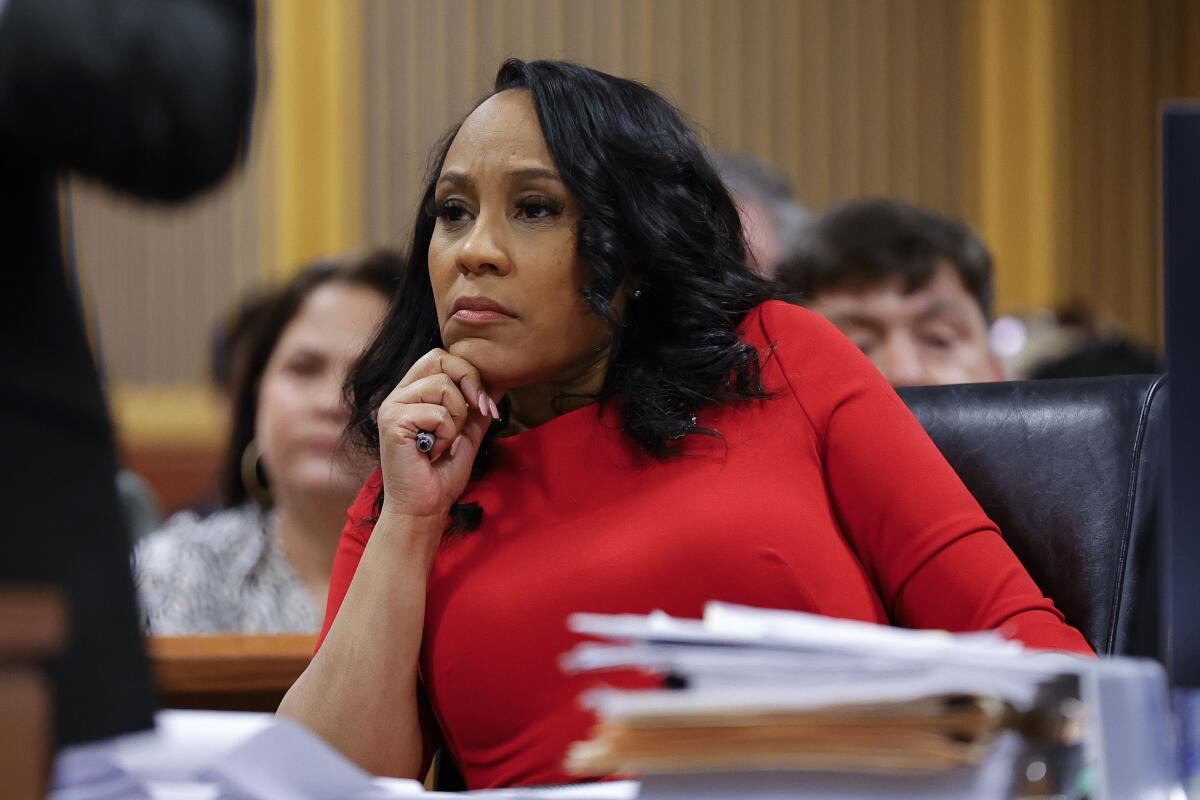Fani Willis’ prosecution of Donald Trump may be alive, but it isn’t well

- Share via
Special prosecutor Nathan Wade’s resignation Friday from the Georgia racketeering prosecution of Donald Trump and others was the right decision and, indeed, a virtually forced one. Judge Scott McAfee’s resolution of a defense motion to disqualify Wade’s boss, Fulton County Dist. Atty. Fani Willis, left no practical alternative.
But it would be a mistake to assume that Wade’s withdrawal puts an end to the ugliness and doubt surrounding Willis’ handling of the case.
To dispel the appearance of a conflict of interest arising out of a romantic relationship between the two prosecutors, McAfee held that either Wade or Willis, along with her entire office, would have to step aside. That made Wade’s withdrawal, which many observers had been urging, the best way to begin to clean up a distracting mess while allowing Willis to continue leading her office and its highest-profile prosecution.
Litman: For the second time in days, the Supreme Court helped make another Trump presidency possible
The justices reversed a Colorado decision disqualifying the ex-president from the ballot under the 14th Amendment. The court is also holding up his Jan. 6 prosecution.
But the order, and the circus-like atmosphere of the multiday evidentiary hearing that preceded it, in some ways served only to intensify the controversy surrounding the case and ensure that the rhetorical challenges will continue.
Notwithstanding the decorous and professional language of McAfee’s order, it lands several haymakers on Willis’ judgment and probity. Probably the most notorious and enduring is his assertion that “an odor of mendacity remains” around the testimony of Willis and Wade, specifically as to the timing of their relationship. It’s a phrase that could have a continuing political impact in Georgia and nationally.
Whatever the judge’s intent, his analysis bolsters Trump and other Republicans in Georgia, which is among the most fiercely contested states in the coming election. With a special committee created by the state Senate investigating Willis and a new law enabling oversight of district attorneys’ offices, Georgia Republicans will have plenty of opportunities to keep sounding the refrain that the problem is not Trump but Willis. A prosecution revolving around an infamous Trump sound bite — “I just need 11,780 votes” — is now tainted by an “odor of mendacity.”
Litman: Without even ruling on Trump’s immunity claim, the Supreme Court handed him a huge victory
The justices will hear arguments in the federal Jan. 6 case, delaying the ex-president’s prosecution for months as his campaign to return to the White House proceeds.
That reality may be deeply unfair, and it is certainly steeped in a Southern stew of racial and sexual politics, but Willis’ conduct will continue to be under intense and even undue scrutiny, particularly as both she and McAfee face an election this year. The motion to disqualify her has already drawn attention to questions that really had no bearing on the legal issues at hand, including precisely when she and Wade began their relationship.
Part of the responsibility for the abiding eyesore that the case has become must be laid at the feet of McAfee. The Fulton County Superior Court judge has earned generally high marks for his even temper and solid preparation for a monster of a case. But the meager allegations in Trump co-defendant Michael Roman’s original motion could have been resolved without the chaotic evidentiary hearing that McAfee convened. The judge even could have denied the motion to disqualify and left it at that.
McAfee’s ultimate rejection of the motion is unassailable because there never was a plausible claim of a financial conflict of interest in Willis’ relationship with Wade, and nothing short of that could justify disqualifying the district attorney. Whatever Wade spent on Willis — for flowers, fancy meals or even airfare — it was not just baseless but also silly to suggest that such benefits drove the district attorney’s management of the case. And that’s all the judge needed to know to reject the defendants’ far-fetched argument.
McAfee, however, permitted the show to go on. And though he properly rejected the claim of a conflict, he roamed into amorphous “appearance of conflict” territory to justify the difficult choice he served up to Willis and Wade in forcing one of them to exit the case.
But Wade’s withdrawal can’t cleanse the case of the stink bomb dropped into the proceedings by Roman and Trump. Even if Willis retakes the reins and pursues the case with impeccable judgment and prudence from this point forward — as there’s no reason to doubt she will — it will be while Trump and his champions shout this counternarrative from the rooftops.
The whole misadventure is only the latest in a recent series of unearned breaks for Trump in his single-minded quest to keep all his trials from going forward before the November election. Willis and a Fulton County grand jury leveled grave charges against the former president. The odds that they will reach trial and a verdict that the American people can consider in choosing their next president are now perilously close to zero.
Harry Litman is the host of the “Talking Feds” podcast and the new Talking San Diego speaker series. @harrylitman
More to Read
A cure for the common opinion
Get thought-provoking perspectives with our weekly newsletter.
You may occasionally receive promotional content from the Los Angeles Times.












